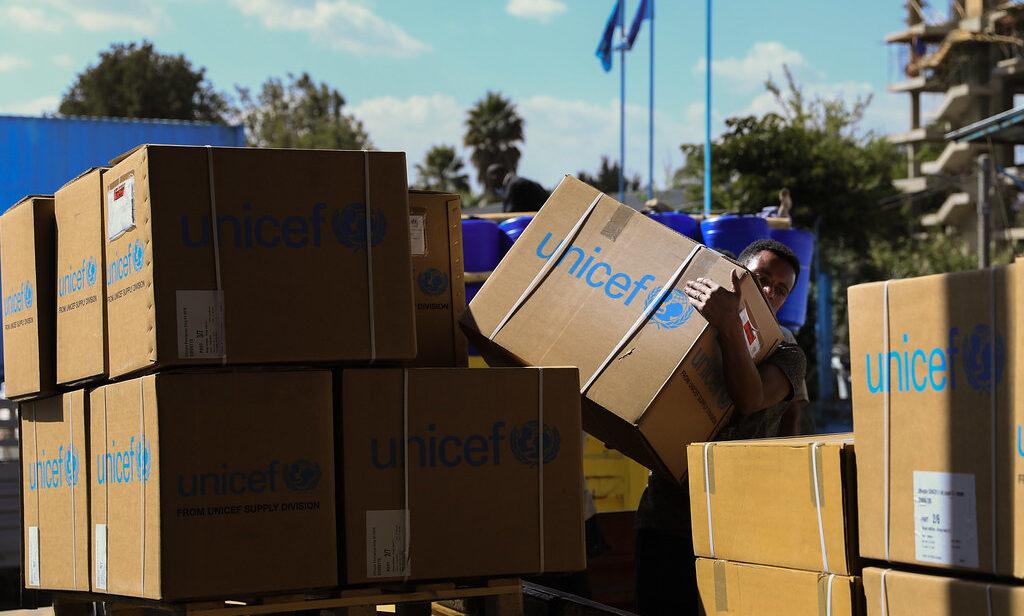Ethiopian government must allow full humanitarian access to Tigray

Despite an agreement with the UN to allow “unimpeded” humanitarian access, very little aid and very few relief workers have been allowed in.

Workers at UNICEF Ethiopia preparing supplies to be transported to Tigray. Credit: UNICEF Ethiopia/NahomTesfaye.
It feels strange to write about a humanitarian crisis in this day and age with barely any pictures, videos or witness testimonies from the ground. But that is what the situation in Ethiopia’s Tigray region has come to. Since the conflict between the federal government, led by Prime Minister Abiy Ahmed, and the regional government’s ruling party, the Tigray People’s Liberation Front (TPLF), began in November 2020, access to the region has been extremely limited.
Internet and telephone connectivity was cut off as soon as the fighting began, disconnecting about 5 million people. Months later, the internet remains down and telephone communication has only been restored in a few main towns. Journalists and human rights monitors are still denied entry and cannot report to the world the full scale of the violence which has left at least hundreds of people dead and more than 470,000 displaced, according to the UN.
The conflict in Tigray is being fought in the dark, at the expense of those who are suffering and desperate for the world to hear and see their pain.
Despite the information blockade, we know enough to recognise that the situation in Tigray is dire. Many of the people displaced by the fighting into neighbouring regions and countries have shared their accounts of the violence, as well as the hunger, thirst, and lack of medical supplies for the sick and injured they left behind.
Relief agencies are ready to help, but the Ethiopian government is refusing to allow full humanitarian access to Tigray. When the region was locked down at the start of the conflict, many expected that humanitarian assistance would be an exception. They were sadly proved wrong. International humanitarian law requires that parties to armed conflict allow and facilitate rapid and unimpeded passage of impartial humanitarian relief for civilians in need, but humanitarian access to Tigray remained completely blocked for almost a month after the conflict began. In December, the UN announced that an agreement had been reached with the Ethiopian government to allow “unimpeded, sustained and secure access” into the areas under its control. Despite this agreement, access remains highly constrained to date.
Instead of allowing full access, the Ethiopian government introduced two separate approval processes for aid shipments and personnel. These approval processes have been slow, and many requests have been denied. So far, a majority of entry requests for relief workers have been denied too, making it incredibly difficult to distribute the very little aid that has been allowed in. An aid worker with more than 40 years of experience recently said that he had “rarely seen an aid response so impeded”.
Meanwhile, the humanitarian crisis across Tigray is getting worse by the day. The UN recently estimated that 2.3 million people were in immediate need of life-saving assistance. There has been no trade with the region since November and the harvest season has been impacted by the conflict, with crops and equipment destroyed and farmers fleeing from their land. The situation is particularly acute in rural areas where humanitarian access has been even more difficult due to the continued fighting and where banks and markets are still closed. The healthcare system in the region has also largely collapsed.
Tigray borders Eritrea and is home to four refugee camps hosting over 96,000 Eritrean refugees – 44% of whom are children. Two of the camps, Hitsats and Shimelba, have not received any humanitarian assistance since the start of the conflict. One refugee who recently fled Hitsats told Amnesty International: “We were eating leaves from the field and drinking water from the nearby well”. Many refugees have been forced to flee the camps. Some have fled to neighbouring towns, where they are begging for food and sleeping outside. Some fled to the capital Addis Ababa, far from the conflict, but were returned to Tigray against their will by the Ethiopian agency in charge of refugee affairs.
The Ethiopian government declared victory at the end of November and has claimed that the situation in Tigray is back to normal. The lack of images, videos and witness testimonies from the ground makes it easier for them to make such claims and for the world to turn its focus away from Tigray. This must not be allowed to continue. People are trapped in an active conflict and suffering immeasurably – citizens and refugees, Ethiopians and Eritreans alike. The Ethiopian government must be held to account for violating international human rights law and humanitarian law by continuing to block full humanitarian access to Tigray.
You can find out more about the campaign #AllowAccessToTigray to pressure Ethiopian Prime Minister to immediately allow full humanitarian access to Tigray.






Primarily the TPLF who has reputation in Terrorist involvement, documented in USA Data base in 1970-1980, attacked and dehumanized the North command of Ethiopia. After that the government took and berried TPLF not to come again. He has also reputation of looting Ethiopians and transfer dollars to outside banks. By defaming Ethiopian government in the name of assistance , you never get the victory you lost in the battle field. By TPLF
Is it to allow puppets of the criminal terrorist TPLF junta who are in the aid organizations to sneak out the remnants of TPLF junta being hunted by ENDF? Nobody is going to be fooled. Game over!!